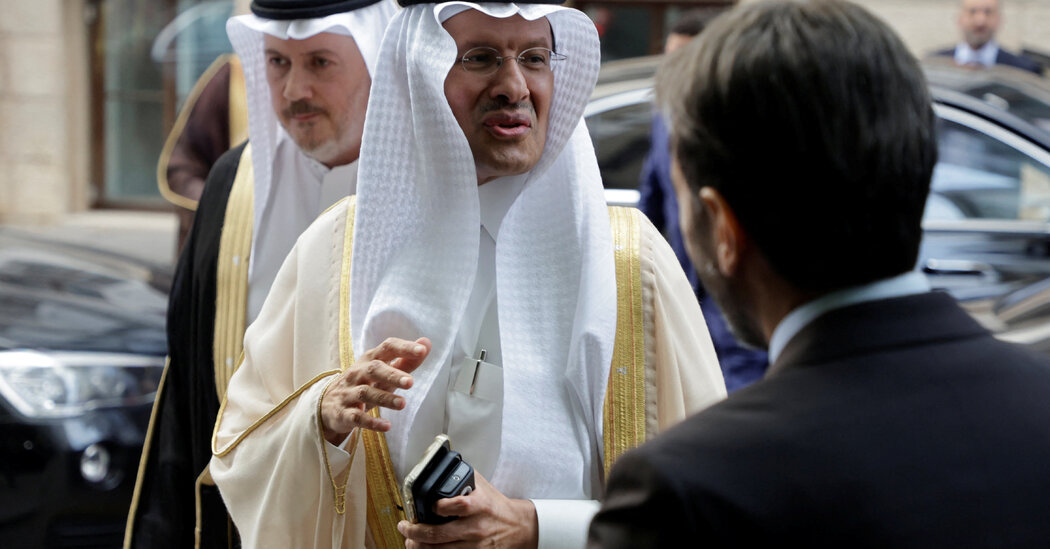The group of major oil-producing nations, known as OPEC Plus, agreed on Sunday to undertake a complex effort to adjust production, aiming to halt the recent slump in oil prices, including an additional one million barrels cut in production. per day through Saudi Arabia. Arabia.
The Saudi rebate would be for one month starting in July, but could be extended.
The group, which includes Russia and its allies, has been under pressure to broker a deal to reverse the pessimism that has dominated the oil market in recent weeks. Despite two substantial cuts in production since October, oil prices have fallen about 15 percent over the past seven months.
The agreement, the result of protracted negotiations on Saturday and Sunday, reworks several countries’ production quotas, with the United Arab Emirates gaining production levels and others losing. “This is certainly not a clean and simple deal,” said Richard Bronze, chief of geopolitics at Energy Aspects, a research firm.
The agreement includes a voluntary reduction of 500,000 barrels per day that Moscow announced in February.
Comments at the post-meeting press conference revealed skepticism about Russia adhering to those lower production levels. Russia’s high production levels and increased share in Asian markets, including India, often at the expense of Middle Eastern oil producers, have become a sensitive issue within the group.
Some data “from Russia just doesn’t add up,” said Suhail al Mazrouei, the oil minister of the United Arab Emirates. He said Russian officials are “reaching out to explain the numbers”.
OPEC Plus said in a statement it was acting “to achieve and maintain a stable oil market,” continuing its recent “proactive and preemptive” approach.
In terms of markets, the main feature of the agreement is the additional production cut by Saudi Arabia, which would bring daily production to around nine million barrels per day. Saudi oil minister Prince Abdulaziz bin Salman called the move “the Saudi lollipop” while announcing it at the press conference.
After suggesting that budget cuts were imminent before the meeting, Prince Abdulaziz was ultimately the only official who agreed to take an immediate blow.
He may have won some long-term concessions. With this agreement, OPEC Plus seeks to address the long-standing discrepancies that have made some of the group’s production decisions almost incomprehensible. For example, some oil-producing countries, including Nigeria and Angola, have been unable to meet their targets for years, partly due to insufficient investment. They’re taking hits on their quotas, starting in 2024.
At the same time, the United Arab Emirates, which is investing billions to boost its capacity to produce oil, was a modest winner on Sunday, with an increased quota of 200,000 barrels per day starting in 2024. The United Arab Emirates has long sought to produce more oil. even stage a rare public fight with the Saudis in 2021 and suggest it could leave OPEC.
Given that oil is vital to the economies and governments of many of these countries, it was not surprising that the thorny issue of tackling quotas spawned a late-night meeting in Vienna.
Mr. Bronze of Energy Aspects said the agreement sought to address issues that had troubled the group. “I think as the market digests the details, there’s real content here,” he said.
Oil officials met over the weekend to decide what to do with markets that had weakened in recent weeks. In particular, Prince Abdulaziz had warned that the group could cut production to jack up prices and trip up traders betting on lower prices.
Other producers, including Russia, are less enthusiastic about cutting production.
Sunday’s meeting came just two months after OPEC Plus announced an earlier round of austerity. Those trims started in May and have had little time to make an impact. Analysts also say oil markets — where prices have fallen by about 12 percent since mid-April — have been heavily impacted by broader economic factors, including China’s weaker-than-expected economic growth since the end of its “zero Covid” policy. That could reduce the impact of cuts.
On Thursday and Friday, after Washington reached a deal on the debt ceiling, prices for Brent oil, the international benchmark, rose by about $3 a barrel to about $76, but prices remain slightly below levels seen on the eve of the reduction in April.
Saudi Arabia’s announcement comes a few days before US Secretary of State Antony Blinken will visit the country for talks with Saudi leaders.
Saudi Arabia is the de facto leader of OPEC Plus, and under Prince Abdulaziz and his younger half-brother, Crown Prince Mohammed bin Salman, the country has become more aggressive in its oil policy than in the past, preferring to cut spending in an attempt to keep a bottom under prices rather than letting the markets take their course.
Crown Prince Mohammed, the kingdom’s chief policymaker, wants high oil revenues to finance his ambitious development plans.
While OPEC does not publish price targets and its officials say it has a long-term view, analysts say the Saudis are now uncomfortable with prices below $80 a barrel of Brent oil. With OPEC Plus producing more than 40 percent of the world’s oil supplies, if they try hard enough, the group can exert significant influence over the markets.
In the past, Saudi Arabian-led OPEC trims have caused friction with the Biden administration, which wants to keep oil prices low to ease pressure on American drivers and prevent them from putting the brakes on the already weak global economy .

